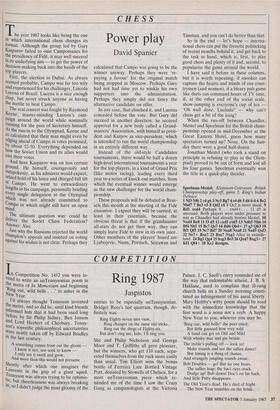CHESS
Power play
David Spanier
The year 1987 looks like being the one in which international chess changes its format. Although the group led by Gary Kasparov failed to oust Campomanes for the presidency of Fide, it may well succeed In its underlying aim — to get the power of decision-making back into the hands of the top players.
First, the election in Dubai. As always seemed probable, Campo was far too wily and experienced for his challenger, Lincoln Lucena of Brazil. Lucena is a nice enough chap, but never struck anyone as having the mettle to beat Campo. The real contest was fought by Raymond Keene, master-minding Lucena's cam- paign around the world while nominally running for the post of Secretary himself. At the run-in to the Olympiad, Keene and co calculated that their man might even be edging ahead of Campo in votes promised, by about 52-50. Everything depended on how the Soviet Union and its allies would cast their votes.
And here Kasparov was on less certain ground. He himself, courageously and outspokenly, as his admirers would expect, seized hold of his lance and charged full tilt at Campo. He went to extraordinary lengths in his campaign, personally briefing every single delegation at the Olympiad Which was not already committed to Campo or which might still have an open mind.
The ultimate question was: could he deliver the Soviet Chess Federation? Answer: Niet.
Just why the Russians rejected the world champion's appeals and insisted on voting against his wishes is not clear. Perhaps they calculated that Campo was going to be the winner anyway. Perhaps they were 're- paying a favour' for the original match being stopped in Moscow. Perhaps Gary had not had time yet to winkle his own supporters into the administration. Perhaps they simply did not fancy the alternative candidate on offer.
In any case, that clinched it, and Lucena conceded before the vote. But Gary did succeed in another direction: he secured approval for a new body called a Grand- masters' Association, with himself as presi- dent and Karpov as vice-president, which is intended to run the world championship in an entirely different way.
Instead of the old-style Candidates tournaments, there would be half a dozen high-level international tournaments a year for the top players, in a kind of Grand Prix (like motor racing), leading every third year to a series of knock-out matches, from which the eventual winner would emerge as the new challenger for the world cham- pionship.
These proposals will be debated in Brus- sels this month at the meeting of the Fide executive. I expect they will be carried, at least in their essentials, because the obvious threat is that if the grandmaster all-stars do not get their way, they can simply leave Fide to stew in its own juice. Other members of the players' board are Ljubojevic, Nunn, Portisch, Seirawan and Timman, and you can't do better than that.
So in the end — let's hope — interna- tional chess can put the frenetic politicking of recent months behind it, and get back to the task in hand, which is, first, to play good chess and plenty of it and, second, to popularise the game around the world.
I have said it before in these columns, but it is worth repeating: if snooker can capture the hearts and minds of our coun- trymen (and women), if a bleary pub game like darts can command hours of TV time, if, at the other end of the social scale, show-jumping is everyone's cup of tea 'Oh well done, Lucinda!' — why can't chess get a bit of the icing?
When the run-off between Chandler, Mestel and Speelman for the British cham- pionship opened in mid-December at the Great Eastern Hotel, guess how many spectators turned up? None. On the Sun- day there were a good half-dozen.
Jonathan Mestel (who took a stand on principle in refusing to play in the Olym- piad) proved to be out of form and lost all his four games. Speelman eventually won the title in a quick-play decider.
Speelman-Mestel: Kleinwort-Grieveson British Championship play-off, game 3; King's Indian Defence. 1 Nf3 Nf6 2 c4 g6 3 Nc3 Bg7 4 e4 d6 5 d4 0-0 6 Be2 Nbd7 7 Be3 e5 8 Qd2 c6 8 Qc2 is more usual. 9 Rdl exd4 Perhaps 9. . . exd4+. . 11 d5 is unsound. Both players were under pressure to win as Chandler had already beaten Mestel. 10 Nxd4 Re8 11 0 d5 12 cxd5 cxd5 13 NdbS Nb6 14 Bf4 Nh5 15 Bc7 Qe7 16 Bd6 Qh4+ 17 g3 Qh3 18 Bfl Qf5 19 Nc7 Bd7 20 Nxa8 Nxa8 21 Nxd5 Qxf3 22 Ne7+ Rxe7 23 Bxe7 Nxg3 Alice in swindle- land. 24 Bg2 Qg4 25 hxg3 Be5 26 Qxd7 Bxg3+ 27 Kfl Qf4+ 28 Ke2 Resigns.










































 Previous page
Previous page